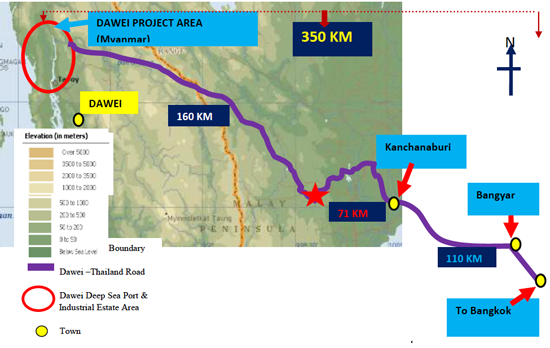In the seminar on 24th August of Friday in Thailand’s Mahidol University, ‘the relationships between Thailand and Myanmar – From Ma Ta Put to Dawei (Tavoy in Burmese)’, three Bangkok based civil society organizations, working on environment and health issues expressed their grave concerns on environmental and health impacts from Dawei deep seaport and industrial estate development project to Thai people near Thailand-Burma border and Burma’s ethnic fishing and farming communities.
A half-day seminar was arranged by academics from Environment and Resources Studies department of Mahidol University (Salaya Campus) and three civil society organizations, Ecological Alert and Recovery – Thailnd, Healthy Public Policy – Thailand, and Towards Ecological Recovery and Regional Alliance (TERRA).
Chairman of TERRA, Mr.. Virawat Thiraprasat, said in the panel discussion, “the local people have a very simple economy, fishing and farming. Why we should not promote these economies, and why Thai investors put heavy industries like steel factories, petrochemical industries, which are never benefiting to the local people”.
He and other panelists on the environment have pointed out that the Thai investors have chosen the Dawei Project to avoid strong local opposition to expansion of industry zone, especially petrochemical industries zone, in the South and in Map Ta Phut, southeast of Thailand.
However, a Thai authority from National Economic and Social Planning Department, Mrs. Potjanee Untarokuenyar confirmed in the panel session that ‘Thai investors especially Italia-Thai Development (ITD) Company will continuously invest billions of dollars in Dawei project for the benefits of both Thai and Burmese (Myanmar) people’.
She also said that the Thai government will support the ITD as a Thai investor, which received a great contract from Myanmar government as a main developer in Burma. He also added Thai and Burmese government agreed to set up ‘temporary border point’ at Puu Nam Ron, from which ITD has been building a road to Dawei deep seaport and industry zone.
But the environmentalists have expressed that the dam construction and dirty petrochemical zones will seriously impacts the livelihood of the local people, wildlife, forests and water resources in the area. They said that the Burmese people have no strong environment laws to protect their resources and health, and the investors may take advantages to invest dirty and heavy industries in the country like Burma.
Kanchanaburi and Nonthaburi district residents in central and western part of Thailand, also questioned the impacts of motorways from Bang Yai, near Bangkok, which pass through Kanchanaburi Province, reached to Puu Nam Ron border point. The resident worried for their communities because their properties on the route of motorways will be taken with compensation costs, but they have more concerns on the transports of toxic materials by trucks passing near their houses. They also said that there will be a serious pollution on these roads.
Thai government’s Transport Department plans to build a 170 kilometers long motorway from Bangkok to the border with Burma, and then ITD is building 160 kilometers long road from the border to Dawei project site.
The Thai government and Burmese government led by President U Thein Sein re-affirmed the Memorandum of Understanding (MoU) when the Burmese president paid for a 3-days visit in the 3rd week of July to Bangkok. He was also shown the Laem Chabang Port and Laem Chabang Industrial Estate in eastern Chon Buri by Thai authorities to inspire him into extending full political support to the Thai-invested Dawei project in Myanmar’s southern town of Dawei.

